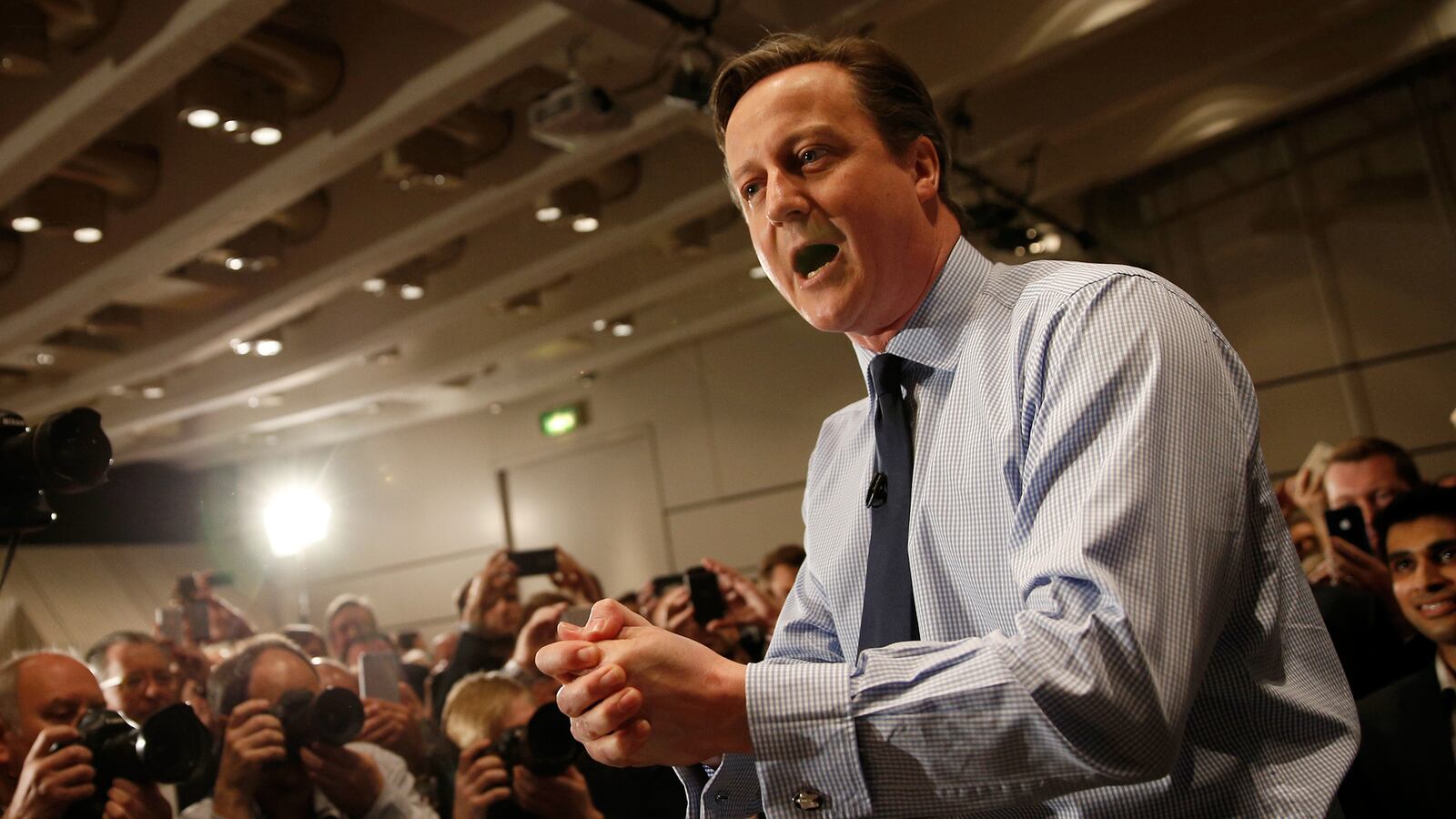LONDON — Stunning exit polls indicated that Prime Minister David Cameron was on track to win a clear victory in the British election on Thursday night.
If the figures prove to be accurate, the Conservative leader would fail to secure a majority in the House of Commons, but he would be in a strong position to form a government that would be expected to rule Britain for the next five years.
The electorate had been given an unusually stark choice: Cameron, the incumbent, pro-business product of Britain’s poshest school, or Ed Miliband, the geeky son of a Marxist intellectual, who would become Britain’s most left-wing leader in a generation.
The exit poll claimed that there had been a dramatic collapse in the Labour vote that was totally unforeseen in months of intensive polling. A Labour Party source said Thursday night: “We are skeptical of the poll. It looks wrong to us.”
There is no presidential-style vote to choose the next prime minister of Britain, and if the exit polls are right, or even close to being right, there will be no majority government. The makeup of the government will be hammered out in backroom wrangling.
If the Liberal Democrats lose more than three-quarters of their seats, as the exit poll suggests, the Conservatives would no longer be able to turn to their old colleague Nick Clegg, the deputy prime minister, to help them form a stable majority government.
That will put Cameron under pressure from the right of his party to go it alone as a minority government unable to guarantee the passage of any laws but with the luxury of no longer needing to negotiate away many of its policies in secretive meetings with rival parties.
The opinion polls for the last year indicated that Cameron had a daunting task. He was always expected to secure the most MPs, but he faced the massed ranks of at least seven anti-Tory parties who were expected to gang up and deny him the ability to govern.
Ed Miliband, the Labour leader, who was expected to be steamrolled by the ruling Conservative Party and its right-wing newspaper supporters, fought a unexpectedly well-received campaign, but it now looks as though he has fallen at the final hurdle. Britain’s newspapers, which waged an unprecedented war of hostility against Miliband, will be declaring victory Friday morning.
Peter Kellner, president of leading pollster YouGov, told The Daily Beast that Labour was unlikely to threaten Cameron’s ability to govern even if there is no stable majority government. “The worst thing for an opposition party to do in the immediate aftermath of an election is act in a way which makes Britain ungovernable,” he said.
The Lib Dems had been expected to be kingmakers once again, but the exit poll suggested a rout. Many people wanted to see them punished for accepting the trappings of office and propping up the Conservatives in the last coalition in exchange for giving away some of their most well-known policy principles.
The exit polls indicated that the collapse of the Lib Dems was to be the most decisive shock of the night. Their hemorrhaging of support allowed the Conservatives to arrest their expected slide.
The first signs of trouble emerged earlier in the day, when Liberal Democrats—who had a strong lead to defend in the seat of Hornsey and Wood Green in north London—privately began to accept that they were on course for defeat.
The suburban district was only 93rd on Labour’s target list, but the Liberal Democrats could not resist a national mood of recriminations against them, after they were seen to have sold out after the 2010 election. “Most of Europe is ruled by coalitions, but people here just can’t get their heads around what we did,” a party official told The Daily Beast.
Labour activists expressed their delight, but the exit polls suggested that this potential Labour bright spot was simply a side effect of a nationwide Liberal Democrat collapse. Professor Patrick Dunleavy, from the London School of Economics’ Department of Government, said the party’s decision to join Cameron’s coalition could prove fatal. “This is existentially disastrous for them,” he said. “Their very existence as a party is in jeopardy.”
Victory for Cameron will ensure that he keeps rivals Boris Johnson and Theresa May at bay for a while, but his failure to win an outright majority for the second election running still leaves him vulnerable. “The paradox is that David Cameron survives as PM but as a minority government that has no power to do anything,” Dunleavy said. “By comparison with every other conservative leader in the last 100 years, he is a feeble no-hoper.”






